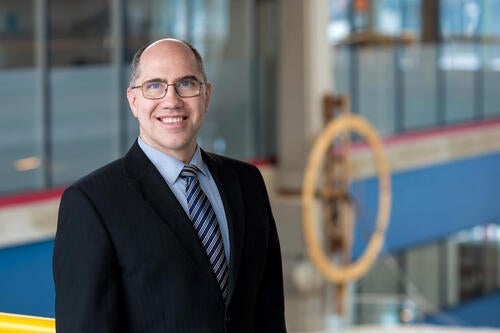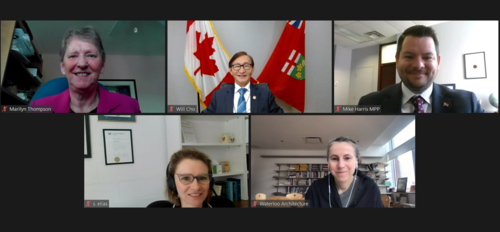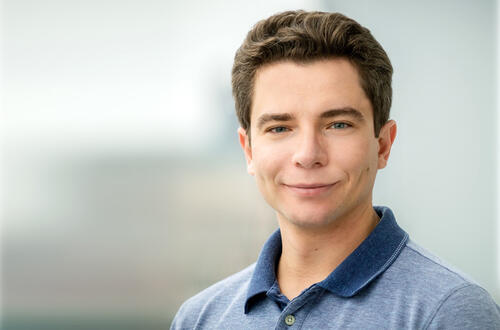The Daily Bulletin is published by Internal and Leadership Communications, part of University Communications
Contact us at bulletin@uwaterloo.ca
Submission guidelines
Editor:
Brandon Sweet
University Communications
bulletin@uwaterloo.ca
A message from the Office of Research.
Learn about concrete ways to embed EDI actions and best practices into grant applications and research activities during a virtual panel presentation and discussion on Tuesday, March 1, from 1 to 2 p.m. The session is open to all Waterloo Faculty and graduate students and is intended to provide an opportunity for participants to actively engage in the session and ask questions to the panelists.
Please register to receive a link to take part in this online panel and Q & A, featuring:
Trevor C. Charles (Professor, Department of Biology, University of Waterloo) will discuss his experience embedding EDI principles to his research group and in a recent NSERC grant application.
Imogen R. Coe (Professor, Dept. Chemistry & Biology, Ryerson University) will share her experience and insight as one of Canada's leading advocates for organizational change towards inclusive excellence in research, particularly in science and medicine.
Leslie Cove (Director, Equity, Diversity and Inclusion in Research, University of Waterloo) will moderate the discussion and Q&A.

This article was originally published on the Faculty of Mathematics website.
The Canadian Mathematical Society (CMS) has granted its prestigious Excellence in Teaching Award for 2022 to Dan Wolczuk, a lecturer in the Faculty of Mathematics.
The CMS accolade is bestowed upon a single member of the society each year in recognition of outstanding contributions and commitment to mathematical pedagogy.
Wolczuk is well-known for his work in teaching and learning, having produced a veritable library of books, resources, videos and other materials in support of undergraduate mathematics courses and the advancement of teaching in the Faculty of Math.
Wolczuk said he has always set out to be an innovator, with his teaching and otherwise, and takes a unique approach to math pedagogy.
“Odd as it may sound, I try not to teach math as such,” he said. “What I do is teach students how to learn math for themselves.”
His student-centred approach is grounded in a desire to especially help undergraduate students as they transition from high school into university. He points out that new university students can have a difficult time picking up functional strategies for studying and completing assignments.
“A big reason I feel like I can connect with the students is that, like so many of them, I also struggled in university math courses,” Wolczuk said. “I had to put in a lot of extra work and figure out strategies for learning so I could succeed. That’s exactly what I try to pass on to my students.”
One aspect of learning to deal with difficulties and overcoming challenges he promotes is a growth mindset. He encourages his students to approach assessment as an opportunity to engage with threshold concepts, rather than as a necessary evil to be dreaded and then forgotten as quickly as possible. Wolczuk says it is important that students understand the purpose of specific forms of assessment, and scaffolds his courses so levels of learning unfold progressively and transparently.
“Another thing I’m interested in is developing mathematical thinking,” he continued. “I approach each course not just as a way to teach a specific piece of the curriculum, but also with an eye to developing analytical skills that can carry over into other math courses or other parts of a student’s degree program.”
Asked about the significance of the CMS award, Wolczuk said he is grateful and humbled to receive such recognition from his peers. He mentioned, in particular, some of his colleagues who were previous winners of the same award, including the 2010 winner Jennifer Hyndman, who was his undergraduate mentor, the 2016 winner Ian VanderBurgh, who he says helped immensely during his early career, and the 2007 winner Brian Forrest, his teaching mentor for the last five years.
“It means so much to me, and I have so many people to thank for their guidance and support. The Faculty of Mathematics has such a deep commitment to pedagogy and that runs top to bottom. I want to especially thank the Dean, Mark Giesbrecht, for the ways he continues to support teaching and learning in the Faculty.”
“The CMS award is invigorating and fuels my passion to continue developing math pedagogy in support of my students and colleagues.”
Read more about the CMS Excellence in Teaching Award on the society’s webpage.

From left to right: Marilyn Thompson, Associate Provost, Human Resources (emcee for the announcement); Minister Raymond Cho (Minister of Seniors and Accessibility); local MPP Mike Harris; Stepanka Elias, Executive Director, Plant Operations; Anne Bordeleau, O’Donovan Director, School of Architecture
Yesterday the Ontario government announced a $400,000 investment through its EnAbling Change Program, which promotes education and awareness about increasing accessibility and inclusivity in academia and building design. The 14 chosen projects will assist people with disabilities, seniors, and other marginalized communities during and beyond COVID-19, making Ontario more accessible to people of all abilities.
Two projects from Waterloo were each awarded over $100,000 through the program, and will be topped up with university contributions.
“The University of Waterloo has always been known for excellence in innovation, and I’m very pleased the Ontario Government is supporting projects that will inform future design strategy and teaching tools for better, more accessible, and inclusive spaces,” said Mike Harris, Member of Provincial Parliament for Kitchener-Conestoga. “As our understanding of accessibility needs grows, so should our response to addressing those needs, and this funding will ensure that design standards evolve to support our changing communities.”
The Inclusive Physical Space Design Strategy: partnership between Plant Operations, APHR-Accessibility, Sustainability, and Campus Wellness. The Inclusive Physical Space Design Strategy will develop an outcome-based design strategy for campus buildings that encompasses all three areas.
The Accessibility in the Built Environment: collaboration with the Canadian Council of University Schools of Architecture (12 schools, with project to be led by Waterloo’s School of Architecture). Accessibility in the Built Environment will develop:

This article was originally published on the Cheriton School of Computer Science website.
Axelar, a decentralized network that connects application builders with blockchain ecosystems, applications and users, has successfully completed a $35 million USD Series B funding round, bringing its market valuation to $1 billion USD. This latest funding infusion follows the company’s previous $25 million Series A funding round in mid-2021 and $3.75 million in seed funding secured in 2020.
Co-founded in 2020 by Cheriton School of Computer Science Professor Sergey Gorbunov, who also serves as CEO, Axelar gives developers the ability to build on the best platform for their needs while using Axelar’s connectivity to allow blockchains to communicate with each other seamlessly.
Cheriton School of Computer Science Professor Sergey Gorbunov builds systems and protocols that protect data and information in untrusted, distributed, and highly adversarial environments such as in cloud computing or blockchains. His research enables new types of applications that have built-in trust and security properties and allows users to share, exchange, and compute information without having to trust each other or any third party.
With this latest round of funding with investments from Dragonfly Capital, Polychain Capital, North Island Ventures, Rockaway Blockchain Fund, Cygni Capital, Lemniscap, Olive Tree Capital, Blockchange Ventures, Node Capital, and angel investors including Waikit Lau and Gokul Rajaram, amongst others, Axelar will continue to grow its network, while laying down foundations for Web3 — a new iteration of the World Wide Web based on blockchain technology.
“Lack of scalable interoperability is the blockchain industry’s biggest obstacle to date, preventing mainstream adoption,” said Professor Gorbunov. “It’s great to see the support from our existing and new investors that see Axelar network as the core infrastructure stack that will accelerate the growth of the entire ecosystem.”
Blockchains are used as digital ledgers for cryptocurrencies as well as many other applications where an immutable ledger is needed to keep track of records and transactions securely. Despite their many uses, blockchains are at an early stage of development and many core infrastructure elements are still missing. A particularly important element for widespread adoption is the ability to connect different blockchain systems. This is precisely what Axelar addresses — building a network, along with the protocols and tools, to easily connect different blockchain ecosystems.
“As we move forward into 2022, there are more blockchain networks than ever before, and mass adoption has begun,” said Professor Gorbunov. “It’s critical that these chains are developed to communicate with one another so that assets such as tokens, NFTs and smart contract information can be transferred between chains. We see the demand ahead and have a huge opportunity to accelerate blockchain space by connecting siloed blockchains.”

This article was originally published on Waterloo News.
Researchers have developed new technology to protect governments, businesses and other organizations from cyberattacks by monitoring for unusual power consumption.
The technology combines a small piece of hardware to collect data with artificial intelligence (AI) software that can determine if power usage in a system is inconsistent with known, predictable patterns. If so, the AI sends an alert to security officials within the organization that its infrastructure might be under attack by hackers or malicious ransomware stealing or locking crucial information.
“If suddenly, for instance, several machines exhibit a similar pattern of high-power usage in specific patterns, we would raise an alert that there might be spreading crypto-ransomware in the network,” said Sebastian Fischmeister, an engineering and computer science professor at the University of Waterloo.
The research team and spinoff company Palitronica Inc. are now testing the technology – which is designed to complement, not replace, existing security controls such as network intrusion detection – in several Ontario municipalities, with a dozen more interested in participating.
“Ransomware and malware are serious threats to municipal governments,” said Jamie McGarvey, the mayor of Parry Sound and president of the Association of Municipalities Ontario. “We have seen an alarming increase in attacks and are encouraged that the University of Waterloo, the security company Palitronica, and the federal government are working with municipalities to improve municipal IT infrastructure systems.”
Fischmeister said the concept at the core of the technology, which is far less vulnerable to tampering since it sits outside the monitored system, means it has a wide variety of potential applications.
“It could be used to protect network equipment and computers, but also water supply, 5G infrastructure, trains and airplanes – we can protect anything that consumes power,” he said.
In the last six years, the technology was developed in projects backed by several government agencies, including the Department of National Defence (DND), and industry partners in defence and critical infrastructure.
“The ability, speed and accuracy of human triage activities of this unique Canadian technology show great promise to efficiently increase the safety and security of our Canadian Armed Forces,” said Eric Fournier, Director General Innovation, Innovation for Defence, Excellence and Security, at the DND.
Students can visit the Student Success Office online for supports including academic development, international student resources, immigration consulting, leadership development, exchange and study abroad, and opportunities to get involved.
Instructors looking for targeted support for developing online components for blended learning courses, transitioning remote to fully online courses, revising current online courses, and more please visit Agile Development | Centre for Extended Learning | University of Waterloo (uwaterloo.ca).
Instructors can visit the Keep Learning website to get support on adapting their teaching and learning plans for an online environment.
Course templates are available within your course in LEARN to help you build and edit your content and assignment pages quickly.
The following workshops, webinars, and events are offered by the KL team (CTE, CEL, ITMS, LIB):
Employees can access resources to help them work remotely, including managing University records and privacy of personal information. Here are some tips for staying healthy while working from home.
The Writing and Communication Centre has virtual services and programs to help undergrads, grad students, postdocs and faculty members with academic writing.
Co-op students can get help finding a job and find supports to successfully work remotely, develop new skills, access wellness and career information, and contact a co-op or career advisor.
The Centre for Career Action (CCA) is currently offering virtual services only. Questions about CCA's services? Live chat or call 519-888-4047 between 8:30 a.m. and 4:30 p.m. EST, Monday to Friday.
Drop-in to Warrior Virtual Study Halls on Wednesdays from 5:30 p.m. to 7:00 p.m. Come together in this virtual space to set goals and work independently or in groups each week.
Renison's English Language Institute continues to offer virtual events and workshops to help students practice their English language skills.
If you feel overwhelmed or anxious and need to talk to somebody, please contact the University’s Campus Wellness services, either Health Services or Counselling Services. You can also contact the University's Centre for Mental Health Research and Treatment. Good2Talk is a post-secondary student helpline available to all students.
The Library is open with expanded hours for access to book stacks, drop-in individual study space, bookable group study rooms, drop-in access to computers and printers, book pick-up services and IST Help Desk support. Librarian consultations, Special Collections & Archives and the Geospatial Centre are available by appointment. Full details on current services and hours are available on the Library’s COVID-19 Update webpage.
The Faculty Association of the University of Waterloo (FAUW) continues to advocate for its members. Check out the FAUW blog for more information.
The University of Waterloo Staff Association (UWSA) continues to advocate for its members. Check out the UWSA blog for more information.
The Sexual Violence Prevention and Response Office (SVPRO) supports all members of the University of Waterloo campus community who have experienced, or been impacted, by sexual violence. This includes all students, staff, faculty and visitors on the main campus, the satellite campuses, and at the affiliated and federated Waterloo Institutes and Colleges. For support, email: svpro@uwaterloo.ca or visit the SVPRO website.
The Office of Indigenous Relations is a central hub that provides guidance, support, and resources to all Indigenous and non-Indigenous campus community members and oversees the University's Indigenization strategy.
The Waterloo Indigenous Student Centre, based at St. Paul’s University College, provides support and resources for Indigenous students, and educational outreach programs for the broader community, including lectures, and events.
WUSA supports for students:
Peer support - MATES, Glow Centre, RAISE, Women’s Centre - Visit https://wusa.ca/peersupport to book an appointment either in person or online for the Fall term.
Food Support Service food hampers are currently available from the Turnkey Desk 24/7 in the Student Life Centre. Drop off locations are also open again in SLC, DC, DP, SCH and all residences.
Co-op Connection all available online. Check https://wusa.ca for more details.
Centre for Academic Policy Support - CAPS is here to assist Waterloo undergraduates throughout their experience in navigating academic policy in the instances of filing petitions, grievances and appeals. Please contact them at caps@wusa.ca. More information is available.
WUSA Student Legal Protection Program - Seeking legal counsel can be intimidating, especially if it’s your first time facing a legal issue. The legal assistance helpline provides quick access to legal advice in any area of law, including criminal. Just call 1-833-202-4571.
Empower Me is a confidential mental health and wellness service that connects students with qualified counsellors 24/7. They can be reached at 1-833-628-5589.
GSA-UW supports for graduate students:
The Graduate Student Association (GSA-UW) supports students’ academic and social experience and promotes their well-being.
Advising and Support - The GSA advises graduate students experiencing challenges and can help with navigating university policies & filing a grievance, appeal, or petition.
Mental Health covered by the Health Plan - The GSA Health Plan now has an 80% coverage rate (up to $800/year) for Mental Health Practitioners. Your plan includes coverage for psychologists, registered social workers, psychotherapists, and clinical counselors.
Dental Care - The GSA Dental Plan covers 60 per cent to 70 per cent of your dental costs and by visiting dental professionals who are members of the Studentcare Networks, you can receive an additional 20 per cent to 30 per cent coverage.
Student Legal Protection Program - Your GSA fees give you access to unlimited legal advice, accessible via a toll-free helpline: +1-833-202-4571. This advice covers topics including housing disputes, employment disputes, and disputes with an academic institution.
The Graduate House: Open Monday to Friday 11:30 a.m. to 6:00 p.m. - We’re open to all students, faculty, staff, and community members. The Graduate House is a community space run by the GSA-UW. Capacity is limited to 50 per cent, and Government ID and Vaccination Records will be required for all dine-in guests. Graduate students who paid their fees can still get discounts and free coffee.
Warriors vs. Laurier Blood Donation Battle. Join our “Waterloo Warriors” team on the Blood.ca website or app. #ItsInYouToGive
Healthy Warriors at Home, free online programs including Nutrition Guides, Personal Training Consults, Health Webinars, Mindfulness Courses and On-demand Fitness. Sign up now.
Reading Week, Sunday, February 20 to Sunday, February 27.
Master of Taxation, Virtual Information Session, Full-time Info Session, Thursday February 24, 11:00 a.m. to 12 noon. To register visit, www.mtax.ca.
Master of Taxation, Virtual Information Session, Part-time Info Session, Thursday, February 24, 1:00 p.m. to 2:00 p.m. To register visit, www.mtax.ca.
WaterLeadership training seminar: Write a policy brief: tips from the experts, presented by Nancy Goucher, Thursday, February 24, 1:00 p.m.
Waterloo.AI Event: Co-Funding for AI Applied Research Projects, Thursday, February 24, 1:00 p.m., virtual event, details and registration information can be found on the event page.
Round Table with WiE Leaders featuring Jasmine Shaw, Thursday, February 24, virtual event, details and registration information can be found on the event page.
Introduce a Girl to Engineering Day Event, Thursday, February 24, virtual event, details and registration information can be found on the event page.
NEW Professional Development Advisory Group (PDAG) seminar featuring Stephen Markan, "Microsoft 365 Groups (Unified Group)," Friday, February 25, 9:00 a.m. to 9:45 a.m., Microsoft Teams. Visit the PDAG seminar page for upcoming events.
The Daily Bulletin is published by Internal and Leadership Communications, part of University Communications
Contact us at bulletin@uwaterloo.ca
Submission guidelines
The University of Waterloo acknowledges that much of our work takes place on the traditional territory of the Neutral, Anishinaabeg, and Haudenosaunee peoples. Our main campus is situated on the Haldimand Tract, the land granted to the Six Nations that includes six miles on each side of the Grand River. Our active work toward reconciliation takes place across our campuses through research, learning, teaching, and community building, and is co-ordinated within the Office of Indigenous Relations.